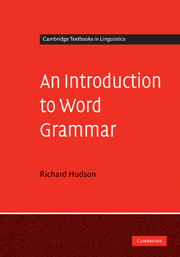9 - Introduction to English linguistics
Published online by Cambridge University Press: 05 June 2012
Summary
English linguistics is the study of English using the ideas and methods of the ‘general linguistics’ that has pushed forward our understanding of how language works.
In comparison with the study of Latin and Greek, the study of English is fairly young, with the first dictionaries and grammars appearing in the seventeenth and eighteenth centuries (Hanks 2006, Wikipedia: ‘History of English grammars’). But serious and systematic grammars of English, as opposed to manuals of ‘good usage’, are even more recent, dating from the late nineteenth and early twentieth centuries. (Wikipedia: ‘Henry Sweet’ and ‘Otto Jespersen’.)
Even these systematic analyses focused on the history of the modern language rather than on its current organization, and tended to pick out details that were in some way interesting or controversial, and which might be of use to advanced learners of English – the kind of people, in fact, who could read the grammar book. Consequently they ignored elementary information (such as basic word order) and general patterns.
Their historical orientation and their focus on details made them rather dauntingly inaccessible to all but their authors' specialist colleagues, with rather predictable results in education, where a proper understanding of English was most needed. In 1921, an official report on grammar teaching in English lessons concluded as follows: ‘[it is] impossible at the present juncture to teach English grammar in the schools for the simple reason that no-one knows exactly what it is’ (Hudson and Walmsley 2005: 601).
- Type
- Chapter
- Information
- An Introduction to Word Grammar , pp. 249 - 250Publisher: Cambridge University PressPrint publication year: 2010



